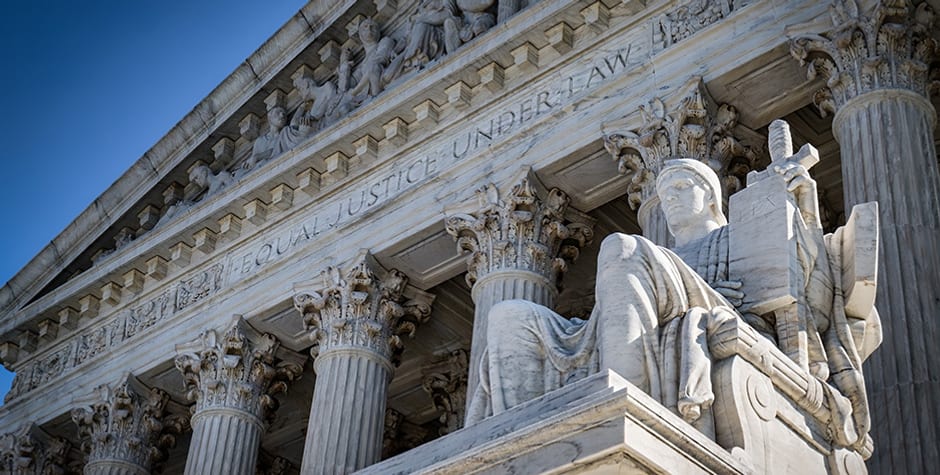Make the Government Pay: ACLJ Urges Supreme Court To Allow Victims of Religious Discrimination To Sue Government Officials for Damages
Listen tothis article
Religious liberty stands at a crossroads. In a critical case now before the Supreme Court, the ACLJ has filed a powerful amicus brief defending the rights of churches, synagogues, and other religious institutions across America. The case, Landor v. Louisiana Department of Corrections, may seem focused on prison conditions, but its implications reach far beyond correctional facilities to every house of worship and religious organization in our nation.
Sign our petition to defend religious liberty: Defeat the Left’s War Against Christians.
The Heart of the Matter: When Rights Need Real Remedies
At stake is whether individuals can obtain meaningful relief – including monetary damages – when government officials violate their religious liberty rights under the Religious Land Use and Institutionalized Persons Act (RLUIPA). This federal law, passed by overwhelming bipartisan majorities in Congress, was designed to protect religious exercise in two critical areas: prisons and land use decisions affecting religious institutions. (Read our Know Your Rights blog on these important protections.)
The question before the Court is deceptively simple yet profoundly important: Can victims of religious discrimination sue government officials personally for damages, or must they settle for weaker remedies that leave officials free to violate religious rights with impunity?
As our brief argues, “When Congress uses the same language in sister statutes enacted for the same purposes, that language should mean the same thing. When it defines ‘government’ to include individual officials and authorizes ‘appropriate relief’ against them, that relief should include the most basic remedy our legal system provides – money damages.”
Why RLUIPA Matters to Every Religious Community
RLUIPA represents one of Congress’ most important efforts to protect religious freedom in modern times. Enacted in response to mounting concerns about religious discrimination, this bipartisan legislation restored critical protections that had been weakened by earlier Supreme Court decisions.
The law’s significance extends to every corner of religious life in America. RLUIPA’s land use provisions protect religious institutions from discriminatory zoning laws and regulatory harassment that have become increasingly common. From suburban communities that zone out synagogues to college towns that harass campus ministries, religious institutions face growing hostility from local authorities. RLUIPA stands as their shield against such discrimination.
In correctional settings, RLUIPA ensures that incarcerated individuals can practice their faith – attending religious services, maintaining dietary restrictions, and engaging in religious study. These protections recognize that religious exercise remains a fundamental right even behind prison walls.
The Constitutional Foundation: Building on Solid Ground
The ACLJ’s brief demonstrates that RLUIPA’s individual-capacity damages remedy rests on firm constitutional ground. Our argument centers on the Supreme Court’s 2020 decision in Tanzin v. Tanvir, which unanimously held that the Religious Freedom Restoration Act (RFRA) – RLUIPA’s sister statute – clearly permits individual-capacity damages against government officials who violate religious rights.
The textual parallel between RFRA and RLUIPA is exact. Both statutes authorize “appropriate relief against a government” and define “government” to include individual officials and persons acting under color of law. As the Court held in Tanzin, this identical language “clear[ly]” authorizes individual-capacity suits.
More importantly, our brief reveals how circuit courts have fundamentally misread the Supreme Court’s decision in Sabri v. United States. In that case, the Court upheld individual criminal liability under federal anti-corruption laws, even when the defendant’s conduct bore no direct connection to federal expenditures. The Court explicitly rejected any requirement that the government prove a direct nexus between individual misconduct and federal funds.
This precedent strongly supports RLUIPA’s individual-capacity damages remedy. If Congress can constitutionally impose individual liability to protect federally funded programs from corruption, it can likewise impose individual liability to protect those same programs from religious discrimination.
The Real-World Impact: Making Rights Meaningful
Without individual-capacity damages, government officials could violate federal religious liberty protections with impunity, knowing that any judgment would not come from their own pockets. This eliminates the personal accountability that makes rights real rather than merely aspirational.
Consider the practical implications for religious communities. A local zoning official could deny a synagogue’s building permit based on religious animus, knowing that only the government entity – not the official personally – might face liability. A prison warden could systematically deny inmates access to religious services, secure in the knowledge that any successful lawsuit would be paid by taxpayers, not from the warden’s own resources.
Individual liability serves a crucial deterrent function that official-capacity suits cannot match. When public officials know they may be personally responsible for violating religious liberty, they are more likely to think twice before trampling constitutional rights.
Looking Forward: The Stakes for Religious Liberty
The Supreme Court’s decision in this case will reverberate throughout the religious liberty landscape. A ruling that weakens RLUIPA’s remedial framework would leave religious communities increasingly vulnerable to government overreach and discrimination.
Conversely, a decision affirming individual-capacity damages would strengthen religious freedom protections nationwide. It would ensure that government officials think carefully before restricting religious exercise and provide meaningful recourse for those whose rights are violated.
As Congress recognized when it passed RLUIPA by overwhelming bipartisan majorities, religious freedom requires more than paper protections – it requires meaningful enforcement mechanisms. Individual damages serve as both compensation for victims of religious discrimination and a deterrent against future violations.
The ACLJ remains committed to defending these vital protections. Religious liberty has always required vigilant defense, and this case represents one of the most important religious liberty battles of our time. We are honored to stand with religious communities across America in urging the Supreme Court to affirm that RLUIPA means what it says: When government officials violate religious rights, they must be held personally accountable.
Take action with us and sign our petition to defend religious liberty at the Supreme Court.
